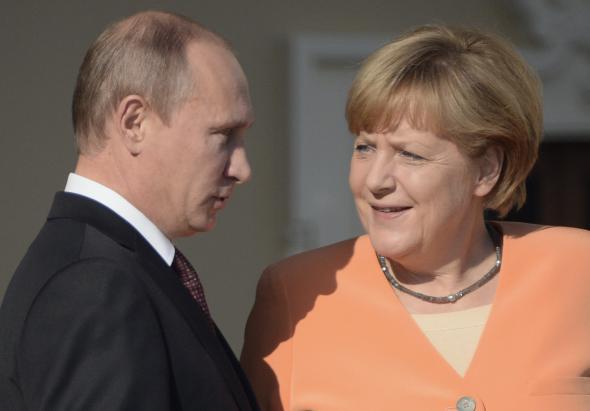In contrast to her predecessor Gerhard Schroeder, who saw himself as an advocate for Russia in Europe and was rewarded with a lucrative Gazprom job for his troubles once he left office, German Chancellor Angela Merkel has never had an exactly friendly relationship with Vladimir Putin. Over the years, it’s been marked by serious disputes over human rights and foreign policy, as well as some pettiness: The Russian president has reportedly exploited the chancellor’s cynophobia by siccing his black lab on her during meetings.
This dynamic doesn’t seem to have changed. According to Peter Baker of the New York Times, Merkel told President Obama on Sunday that “after speaking with Mr. Putin she was not sure he was in touch with reality.”
But personal feelings aside, of all the major leaders in the current standoff over Ukraine, Merkel—the de facto leader of the EU in situations like this—has been the most cautious. Though Berlin played an important diplomatic role during the anti-Yanukovych protests, the Germans were the last to pull out of a planned G8 summit for June and its leaders have expressed skepticism about ideas like kicking Russia out of the grouping entirely or imposing punitive sanctions on Russian leaders.
Russia did agree to allow Merkel to form a fact-finding mission to defuse tensions in Crimea, but this hasn’t gone far enough for some officials in Washington. “The EU is dysfunctional, but Berlin is the real problem,” said one former official quoted in Der Spiegel. Sen. John McCain described Merkel’s proposal as “milquetoast.”
So why is Merkel so hesitant? For one thing, increased tensions with Moscow could be costly for Germany, which relies on Russia for more than a third of its oil and natural gas. As Germany moves off nuclear power, that reliance may increase. The two countries are also major trading partners.
Beyond the economic facts, it’s worth keeping in mind that the stakes of this standoff likely seem a lot higher in Germany—as Der Spiegel points out, it’s just a three-hour flight from Frankfurt to Simferopol—than in the United States.
When German Foreign Minister Frank-Walter Steinmeier says that “Europe is, without a doubt, in its most serious crisis since the fall of the Berlin Wall” and that “there’s a new, real danger that Europe will split once again,” he’s talking about something a bit more salient to Germans with a memory of the 20th century than when U.S. politicians make the case that American interests are at stake in Russia’s near-abroad.
With Putin sounding a bit less bellicose today, or at least less enthusiastic about the idea of expanding military operations into eastern Ukraine, it could be that the good-cop-bad-cop diplomacy combined with the financial markets is helping to de-escalate the crisis.
But even if you think Merkel’s position in this crisis has been hopelessly feckless and naïve, I don’t think the sniping from Washington is really going to do much to convince her to be more resolute.
